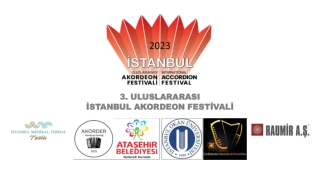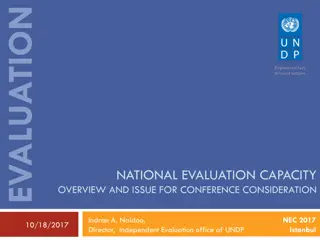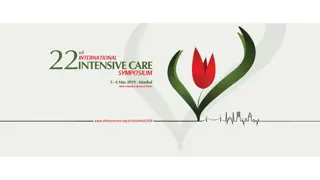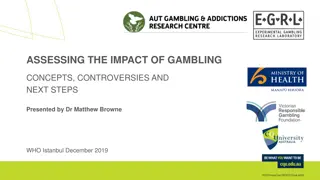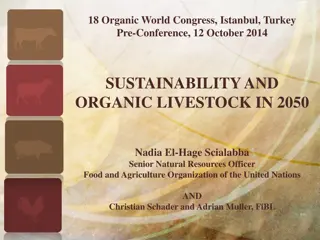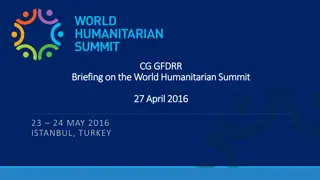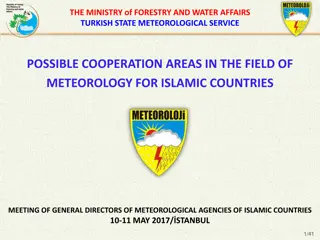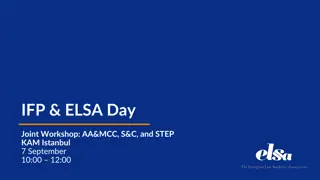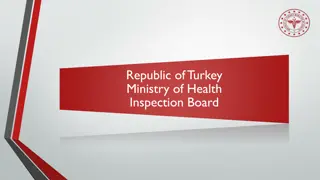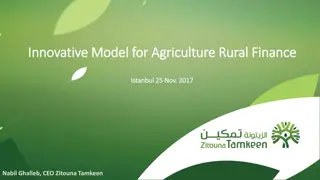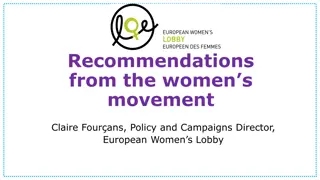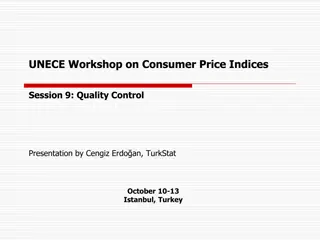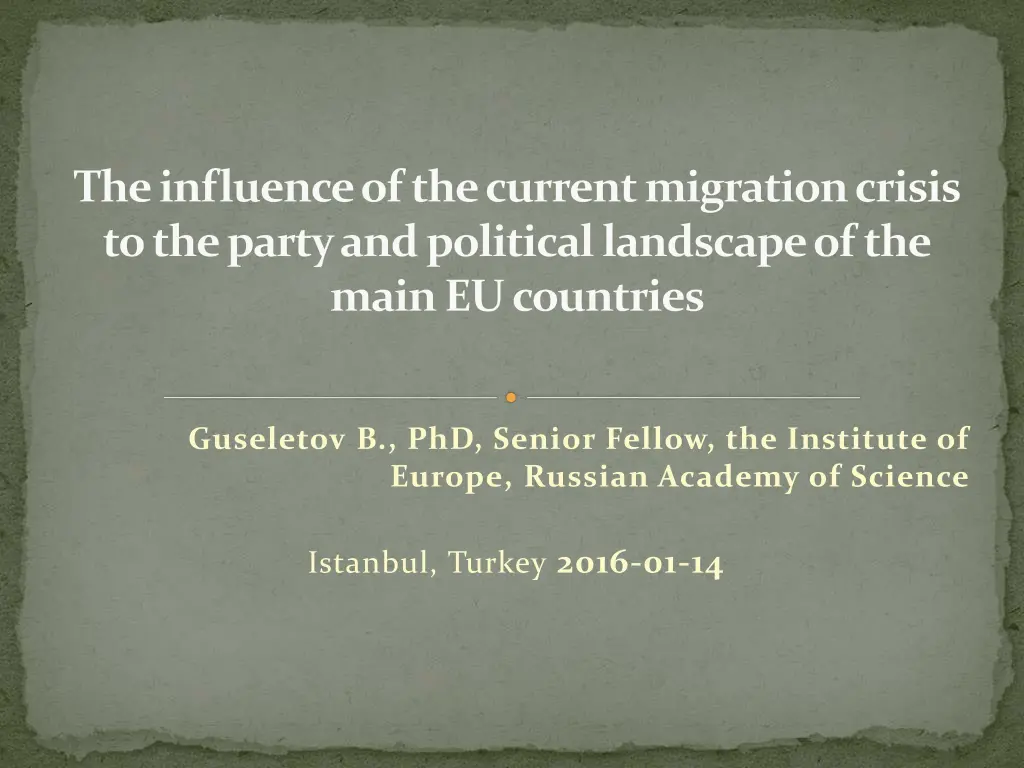
Influence of Migration Crisis on EU Political Landscape
The migration crisis in Europe in 2015 due to conflicts in the Middle East has led to a shift in the political landscape, with the rise of anti-immigration sentiments and right-wing forces gaining popularity. This has resulted in ethno-social conflicts and the emergence of radical Islamist structures, impacting EU countries' party politics.
Download Presentation

Please find below an Image/Link to download the presentation.
The content on the website is provided AS IS for your information and personal use only. It may not be sold, licensed, or shared on other websites without obtaining consent from the author. If you encounter any issues during the download, it is possible that the publisher has removed the file from their server.
You are allowed to download the files provided on this website for personal or commercial use, subject to the condition that they are used lawfully. All files are the property of their respective owners.
The content on the website is provided AS IS for your information and personal use only. It may not be sold, licensed, or shared on other websites without obtaining consent from the author.
E N D
Presentation Transcript
The influence of the current migration crisis to the party and political landscape of the main EU countries Guseletov B., PhD, Senior Fellow, the Institute of Europe, Russian Academy of Science Istanbul, Turkey 2016-01-14
The influence of the current migration crisis to the party and political landscape of the main EU countries The tendencies of 2015 2015th year was very heavy for Europe. The unstable situation in the Middle East, especially in Syria, has created "chaos" in which Europe has penetrated more than 1 million refugees (according to the International Organization for Migration). EU migration policy, abandoning the principle of collective identity, has led to an aggravation of the ethno-social conflicts. As a result, Europe was imbued with ethno-social array of migrants from the Middle East, which in fact are the bearers of Islamic identity, does not fit into theculture medium of the modern European type. As a result of the migration policy of the EU in 2015 1) was disrupted balance between indigenous Europeans and migrants; 2) have been established extensive Islamic-Arab socio-cultural field; 3) was created a breeding ground for the creation of structures of radical Islamism, it reinforced the fact that the uncontrolled flow of refugees to Europe entered the representativesof radical Islamicorganizations. 2
The influence of the current migration crisis to the party and political landscape of the main EU countries
The influence of the current migration crisis to the party and political landscape of the main EU countries Ways to illegal immigration to Europe
The influence of the current migration crisis to the party and political landscape of the main EU countries The rise in popularity of Right Forces In many European countries, anti-immigration sentiment in 2015 and intensified criticism of Brussels migration policy was becoming moreand more popular. In 2015, the right-wing forces began to gain all the more popular in Europe: the "National Front in France, the movement "Pegida" and "Alternative for Germany" in Germany, "Austrian Freedom Party" in Austria, the "Northern League" in Italy, "Golden Dawn " in Greece. The results of the regional elections (especially the first round) in France came as a surprise to the ruling elites. The first round of regional elections showed that the "National Front" has become not only legitimate, but also a legal political force (the victory in six regions of France - 30, 8% in France, in contrast to the Republicans, who have just 27.2% and the Socialists, caught third place - 22.7%). 5
The influence of the current migration crisis to the party and political landscape of the main EU countries The results of the first round of regional elections in France
The influence of the current migration crisis to the party and political landscape of the main EU countries The results of the first round was thrilled ruling party of socialists and French Prime Minister M. Waltz after the announcement of the results called for a unified coalition against the "National Front", which would include both left and right-wing forces. Sarkozy and Republicans from the declined, but the scheme "united front" against Marine Le Pen has worked in the second round of regional elections has reached its goals. Both left and right were united by a single enemy - the "National Front", the only party in France, dared to link terrorist acts with illiterate EU migration policy. proposed collaboration 7
The influence of the current migration crisis to the party and political landscape of the main EU countries In Germany the movement Pegida ( "Patriotic Europeans against the Islamization of the West") it becomes more and more popular, more than 30 thousand people participate in the demonstration organized by this movement. Slogan of Pegida are as follows:. "For the preservation of our culture", Against the religious wars on German soil . The popularity of the center-right party "Alternative for Germany" (AFG) also growing and this Party has gained in the elections to the European Parliament in 2014 about 10%. The main program of the party directed against the liberal hegemony of Brussels and has Eurosceptic and anti-American character. The popularity of the party is growing rapidly day by day and the results of the regional elections in Germany in March 2016 confirm it. AFG" was held in the parliaments of all three states. Her greatest success has been achieved in Saxony-Anhalt, where it has about 24% of the vote. In Baden-W rttemberg - about 15%, and in Rhineland-Palatinate - more than 12%. 1. 2. 8 3.
The influence of the current migration crisis to the party and political landscape of the main EU countries Eurosceptics in parliament (highlighted in red) in Europe: 2011 and 2015
The influence of the current migration crisis to the party and political landscape of the main EU countries The triumph and the collapse of the left forces In 2015, the left forces managed an incredible first time since the fall of the Soviet Union left-wing forces gained legality and legitimacy. SYRIZA in Greece, the growing popularity of the party Podemos in Spain, the movement Five stars" in Italy. 2015 (especially the first half) can truly be called a triumph of leftist anti-liberal non-systemic forces. But in fact, the left has shown unwillingness to offer an alternative to the liberal policies they so actively criticized. As a result, by the end of the year they have lost the trust of citizens and political influence. Left today do not have anything to retain power. Hopes pinned on the peoples of Europe left- wing forces did not materialize. 10
The influence of the current migration crisis to the party and political landscape of the main EU countries Regionalism In 2015, the regionalist sentiment intensified in Europe. The most interesting case today is Catalonia. The vast majority of survey Catalans were in favor of the Catalan independence from Spain (although the official referendum was not conducted). On September elections to the regional parliament defeated a coalition of Catalan separatists, received 62 seats out of 135. In November, the Catalan Parliament passed a resolution on independence from Spain (according to resolution - within 18 months of Catalonia should secede from Spain, during this time in Catalonia to be created all the structures of the new state and a new constitution). Another region, is fighting for the independence of Scotland. However, the official held a referendum in 2014 - 55% of Scots still wanted to remain part of the UK. In Italy is very popular party "League of the North", serving since its founding in 1994 tosecede from the south. 11
The influence of the current migration crisis to the party and political landscape of the main EU countries Forecast for 2016 Refugees crisis in Europe will continued EU migration policy will not undergo significant changes, the number of refugees will continue to grow. In 2016 ethnic conflicts intensify, penetrated into the general flow of refugees in 2015, the members of extremist organizations try to organize new attacks.. The growing popularity of right-wing anti-systemic forces In 2016, right-wing anti-European party system will continue to gain in popularity. In France, the National Front finally became a real political force, which can be compete system parties (socialists, republicans). Systemic political forces both left and right toughen political struggle against Marine Le Pen, united into a single unit against the National Front, and try all possible means to discredit the party and its leader before the presidential election 2017.
The influence of the current migration crisis to the party and political landscape of the main EU countries Germany is expected to increase the popularity of right-wing forces, such as the extreme right, such as Pegida and NPD and right centrists - "Alternative for Germany", which, apparently, will receive the regional elections in March 2016 high results. The political mood will shift towards euosceptisism and nationalism. Italy will continue to gain popularity the party "Northern League", which will try to forge an alliance with Berlusconi's party. Possible consolidation of Right Forces, Salvini popularity due to its anti-American program will grow rapidly, to strengthen its influence in the southern regionsof Italy. In Poland will be dominated by the liberal-conservative mood (the party Law and Justice"). In Hungary will continue to consolidate and strengthen the right-wing forces of the nationalist movement ( Jobbik - "Fora Better Hungary"). 13
The influence of the current migration crisis to the party and political landscape of the main EU countries Euroscepticism Eurosceptics mood due to migration crisis will intensify. The migration policy of the EU has demonstrated its inadequacy in dealing with inter-civilizational and inter-ethnicconflicts. In February, the UK will review the terms of the alliance with the European Union (review of the euro as the single EU currency, the refusal to participate in the financial assistance programs of the euro area countries, reducing over-regulation of the EU economy, the revision in the field of migrants social benefits policy), and to the 23 June 2016 will be a referendum on membership in the EU. The Italian government is trying to balance between the politics of Brussels and its own economic interests (partial elimination of sanctions against Russia), eurosceptic trends will be set right conservative parties. The EU as an organization can lose its political importance.
The influence of the current migration crisis to the party and political landscape of the main EU countries The Crisis of the "Left forces Greek Prime Minister A. Tsipras and left-wing government will not be able to cope with the economic and social problems of Greece. Tsipras can no longer be true leftist political settings, to fulfill their campaign promises, providing social guarantees. In the current tough economic situation, closely monitored by Brussels - left ideology can not be realized. Increase the discontent left forces that cause a number of large-scale protests in the country. Against the background of the crisis of the left forces to significantly strengthen the position of right-wing parties. This right-wing parties will exploit the economic model left: Golden Dawn will adopt a left economic ideology. In Europe in 2016 due to the crisis of the left forces - many right-wing parties will carry out a policy of the left. Model rigid division on the right and left - will fail. "Today, the split in France. Not split into left and right political forces, but the country's division into patriots and mondialists" tell Marine Le Pen, December 13, 2015, after the announcement of the results of the second round of elections. Regionalism Separatist sentiment effort: active struggle for independence will lead Catalonia, Corsica and Scotland. 15

